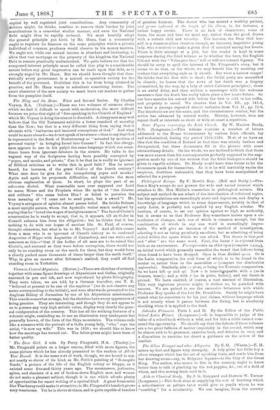attaches to Mr. Max Mfiller's researches in philological science. His
subject and method do not admit of the introduction of collateral topics, but his speculations are exceedingly acute and ingenious, and display a knowledge of language which in some departments, notably in that of early Latin, is probably not equalled by any English scholar. We hesitate, of course, to set our opinion against so high an authority, but it seems to us that Professor Key sometimes insists upon a co-
incidence of changes, each one of which is common enough, but the combination of which in any one word is exceedingly impro- bable. We will give an instance of the method of investigation, selecting it not as being peculiarly excellent, but as admitting of being stated within the space which wo can afford. The thesis is that post and " after " are the same word. First, the letter t is rejected from both as an excrescence. Pos represents an older opos (compare ozidc,j), an initial vowel which generally resembles the vowel that follows being often found to have boon dropped. Opos is thus divided op-os. Os is the Latin comparative, the real form of which is to be found in the neuter us, rather than in the masculine or (compare the diminutive majusculus). Similarly, afer of-or, er being the Teutonic comparative.
So wo have left op and af. Now o is interchangeable with a (as in domare, tame) ; and p with .1 (as in pater, father), and our thesis is
proved. Wo have omitted, of course, a vast amount of illustration.
This very ingenious process might, it strikes us, be parodied with success. We are pained to see the excessive bitterness with which Professor Key speaks of the late Dr. Donaldson. Surely he might have stated what he conceives to be his just claims, without language which is not seemly when it passes between the living, but is absolutely shocking when it is applied to the dead.


































 Previous page
Previous page